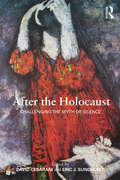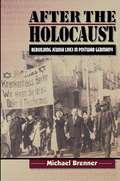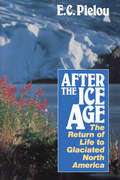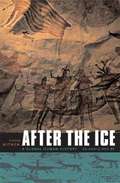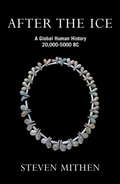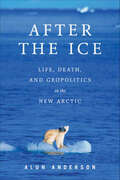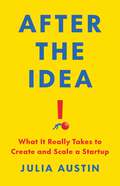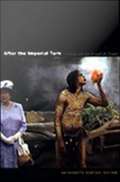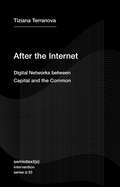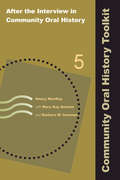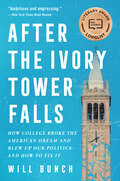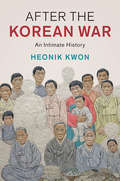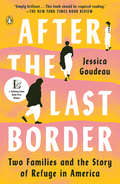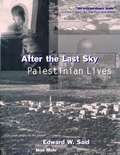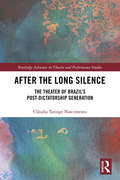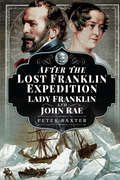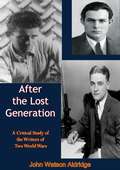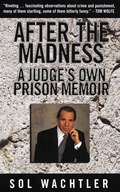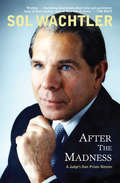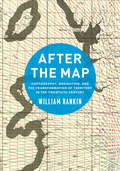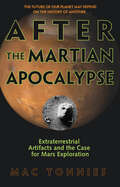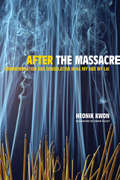- Table View
- List View
After the Holocaust: Challenging the Myth of Silence
by Eric J. Sundquist David CesaraniFor the last decade scholars have been questioning the idea that the Holocaust was not talked about in any way until well into the 1970s. After the Holocaust: Challenging the Myth of Silence is the first collection of authoritative, original scholarship to expose a serious misreading of the past on which, controversially, the claims for a ‘Holocaust industry’ rest. Taking an international approach this bold new book exposes the myth and opens the way for a sweeping reassessment of Jewish life in the postwar era, a life lived in the pervasive, shared awareness that Jews had narrowly survived a catastrophe that had engulfed humanity as a whole but claimed two-thirds of their number. The chapters include: an overview of the efforts by survivor historians and memoir writers to inform the world of the catastrophe that had befallen the Jews of Europe an evaluation of the work of survivor-historians and memoir writers new light on the Jewish historical commissions and the Jewish documentation centres studies of David Boder, a Russian born psychologist who recorded searing interviews with survivors, and the work of philosophers, social thinkers and theologians theatrical productions by survivors and the first films on the theme made in Hollywood how the Holocaust had an impact on the everyday life of Jews in the USA and a discussion of the different types, and meanings, of ‘silence’. A breakthrough volume in the debate about the ‘Myth of Silence’, this is a must for all students of Holocaust and genocide.
After the Holocaust: Rebuilding Jewish Lives in Postwar Germany
by Michael BrennerThis landmark book is the first comprehensive account of the lives of the Jews who remained in Germany immediately following the war. Gathering never-before-published eyewitness accounts from Holocaust survivors, Michael Brenner presents a remarkable history of this period. While much has been written on the Holocaust itself, until now little has been known about the fate of those survivors who remained in Germany. Jews emerging from concentration camps would learn that most of their families had been murdered and their communities destroyed. Furthermore, all Jews in the country would face the stigma of living, as a 1948 resolution of the World Jewish Congress termed it, on "bloodsoaked German soil." Brenner brings to life the psychological, spiritual, and material obstacles they surmounted as they rebuilt their lives in Germany. At the heart of his narrative is a series of fifteen interviews Brenner conducted with some of the most important witnesses who played an active role in the reconstruction--including presidents of Jewish communities, rabbis, and journalists. Based on the Yiddish and German press and unpublished archival material, the first part of this book provides a historical introduction to this fascinating topic. Here the author analyzes such diverse aspects as liberation from concentration camps, cultural and religious life among the Jewish Displaced Persons, antisemitism and philosemitism in post-war Germany, and the complex relationship between East European and German Jews. A second part consists of the fifteen interviews, conducted by Brenner, with witnesses representing the diverse background of the postwar Jewish community. While most of them were camp survivors, others returned from exile or came to Germany as soldiers of the Jewish Brigade or with international Jewish aid organizations. A third part, which covers the development of the Jewish community in Germany from the 1950s until today, concludes the book.
After the Ice Age: The Return of Life to Glaciated North America
by E. C. PielouThe fascinating story of how a harsh terrain that resembled modern Antarctica has been transformed gradually into the forests, grasslands, and wetlands we know today. "One of the best scientific books published in the last ten years. "-Ottowa Journal "A valuable new synthesis of facts and ideas about climate, geography, and life during the past 20,000 years. More important, the book conveys an intimate appreciation of the rich variety of nature through time. "-S. David Webb,Science
After the Ice Age: The Return of Life to Glaciated North America (None Ser.)
by E.C. PielouThe fascinating story of how a harsh terrain that resembled modern Antarctica has been transformed gradually into the forests, grasslands, and wetlands we know today.
After the Ice: A Global Human History 20,000-5000 BC
by Steven MithenArchaeology says present day humans have been on the planet for eighty thousand years. The first writing has been dated to 3,500 BC. This is what humanity may have been during from 20,000 to 5,000 BC, during the period of global warming which followed the last great ice age. The author uses archaeology to talk about humans at various times during this period of time and at various places on the planet. This book is about what life may have been like day to day over a fifteen thousand year period before we learned to write and live in cities.
After the Ice: A Global Human History, 20,000 - 5000 BC
by Prof Steven MithenA fantastic voyage through 15,000 years of history that laid the foundations for civilisation as we know it by award-winning science writer Steven Mithen.Twenty thousand years ago Earth was in the midst of an ice age. Then global warming arrived, leading to massive floods, the spread of forests and the retreat of the deserts. By 5,000 BC a radically different human world had appeared. In place of hunters and gatherers there were farmers; in place of transient campsites there were towns. The foundations of our modern world had been laid and nothing that came after - the Industrial Revolution, the atomic age, the internet - have ever matched the significance of those events. AFTER THE ICE tells the story of climate change's impact during this momentous period - one that also saw the colonisation of the Americas and mass extinctions of animals throughout the world. Drawing on the latest cutting-edge research in archaeology, cognitive science, palaeontology, geology and the evolutionary sciences, Steven Mithen creates an evocative, original and remarkably complete picture of minds, cultures, lives and landscapes through 15,000 years of history.
After the Ice: A Global Human History, 20,000 - 5000 BC
by Steven MithenA fantastic voyage through 15,000 years of history that laid the foundations for civilisation as we know it by award-winning science writer Steven Mithen.Twenty thousand years ago Earth was in the midst of an ice age. Then global warming arrived, leading to massive floods, the spread of forests and the retreat of the deserts. By 5,000 BC a radically different human world had appeared. In place of hunters and gatherers there were farmers; in place of transient campsites there were towns. The foundations of our modern world had been laid and nothing that came after - the Industrial Revolution, the atomic age, the internet - have ever matched the significance of those events. AFTER THE ICE tells the story of climate change's impact during this momentous period - one that also saw the colonisation of the Americas and mass extinctions of animals throughout the world. Drawing on the latest cutting-edge research in archaeology, cognitive science, palaeontology, geology and the evolutionary sciences, Steven Mithen creates an evocative, original and remarkably complete picture of minds, cultures, lives and landscapes through 15,000 years of history.
After the Ice: Life, Death, and Geopolitics in the New Arctic
by Alun AndersonNew from Smithsonian Books, After the Ice is an eye-opening look at the winners and losers in the high-stakes story of Arctic transformation, from nations to native peoples to animals and the very landscape itself. Author Alun Anderson explores the effects of global warming amid new geopolitical rivalries, combining science, business, politics, and adventure to provide a fascinating narrative portrait of this rapidly changing land of unparalleled global significance.
After the Idea: What It Really Takes to Create and Scale a Startup
by Julia AustinEntrepreneurship expert Julia Austin shares battle-tested strategies to help founders and startup joiners build their venture from the ground up in this &“masterclass in intentional entrepreneurship&” (Jerry Colonna, author of Reboot) So you want to start a company. Or you were crazy enough to join a startup. You had a great idea, you built a prototype, and maybe you even raised some money. Now what? Julia Austin is here to answer that big question. She has both experienced and observed that the differentiator between the startups that succeed and those that fail is operational excellence. A lot of entrepreneurs are great at the idea part but do not anticipate the details required to actually run and scale a new venture. Drawing on Austin&’s extensive experience at renowned startups like Akamai, VMware, and DigitalOcean and the hundreds of founders and startups she has educated, coached, and advised, After the Idea is full of time-tested strategies to help founders, investors, and employees navigate the operational challenges of startup ventures, including customer development, scalability, process optimization, team management, and more. This accessible set of techniques is for anyone determined to turn a great idea into a solid success.
After the Imperial Turn: Thinking with and Through the Nation
by Antoinette BurtonFrom a variety of historically grounded perspectives, After the Imperial Turn assesses the fate of the nation as a subject of disciplinary inquiry. In light of the turn toward scholarship focused on imperialism and postcolonialism, this provocative collection investigates whether the nation remains central, adequate, or even possible as an analytical category for studying history. These twenty essays, primarily by historians, exemplify cultural approaches to histories of nationalism and imperialism even as they critically examine the implications of such approaches. While most of the contributors discuss British imperialism and its repercussions, the volume also includes, as counterpoints, essays on the history and historiography of France, Germany, Spain, and the United States. Whether looking at the history of the passport or the teaching of history from a postnational perspective, this collection explores such vexed issues as how historians might resist the seduction of national narratives, what--if anything--might replace the nation's hegemony, and how even history-writing that interrogates the idea of the nation remains ideologically and methodologically indebted to national narratives. Placing nation-based studies in international and interdisciplinary contexts, After the Imperial Turn points toward ways of writing history and analyzing culture attentive both to the inadequacies and endurance of the nation as an organizing rubric. Contributors. Tony Ballantyne, Antoinette Burton, Ann Curthoys, Augusto Espiritu, Karen Fang, Ian Christopher Fletcher, Robert Gregg, Terri Hasseler, Clement Hawes, Douglas M. Haynes, Kristin Hoganson, Paula Krebs, Lara Kriegel, Radhika Viyas Mongia, Susan Pennybacker, John Plotz, Christopher Schmidt-Nowara, Heather Streets, Hsu-Ming Teo, Stuart Ward, Lora Wildenthal, Gary Wilder
After the Internet: Digital Networks between Capital and the Common (Semiotext(e) / Intervention Series #33)
by Tiziana TerranovaOn the internet's transformation from communication tool to computational infrastructure.The internet is no more. If it still exists, it does so only as a residual technology, still effective in the present but less intelligible as such. After nearly two decades and a couple of financial crises, it has become the almost imperceptible background of today&’s Corporate Platform Complex (CPC)—a pervasive planetary technological infrastructure that meshes communication with computation.In the essays collected in this book, written mostly between the mid-2000s and the late 2010s, Tiziana Terranova bears witness to this monstrous transformation. Mobilizing theories of cognitive capitalism, neo-monadology, and sympathetic cooperation, considering ideas such as the attention economy and its psychopathologies, and evoking the relation between algorithmic automation and the Common, she provides real-time takes on the mutations that have changed the technological, cultural, and economic ethos of the Internet. Mostly conceived, elaborated, and discussed in collective activist spaces, After the Internet is neither apocalyptic lamentation nor melancholic &“rise and fall&” story of betrayed great expectations. On the contrary, it looks within the folds of the recent past to unfold the potential futurities that the post-digital computational present still entails.
After the Interview in Community Oral History (Community Oral History Toolkit #5)
by Nancy MacKay Barbara W Sommer Mary Kay QuinlanCommunity projects often falter after the interviews are completed. This final book of the five-volume Community Oral History Toolkit explains the importance of processing and archiving oral histories and takes the reader through all the steps required for good archiving and for concluding the oral history project so that it is preserved and accessible for future generations. The authors give special attention to record-keeping systems and repositories, and provide several examples from actual projects to ground the information in practical terms. Charts, checklists, and sample forms also help the reader apply concepts to practice. Volume 5 finishes with examples of creative ways community projects have used oral histories, such as performances, exhibitions, celebrations, websites, and more, in order to promote history and engage the community.
After the Ivory Tower Falls: How College Broke the American Dream and Blew Up Our Politics—and How to Fix It
by Will BunchFrom Pulitzer Prize–winning journalist Will Bunch, the epic untold story of college—the great political and cultural fault line of American life"This book is simply terrific." —Heather Cox Richardson, publisher of the "Letters from an American" Substack"A must-read." —Nancy MacLean, author of Democracy in ChainsToday there are two Americas, separate and unequal, one educated and one not. And these two tribes—the resentful “non-college” crowd and their diploma-bearing yet increasingly disillusioned adversaries—seem on the brink of a civil war. The strongest determinant of whether a voter was likely to support Donald Trump in 2016 was whether or not they attended college, and the degree of loathing they reported feeling toward the so-called “knowledge economy of clustered, educated elites. Somewhere in the winding last half-century of the United States, the quest for a college diploma devolved from being proof of America’s commitment to learning, science, and social mobility into a kind of Hunger Games contest to the death. That quest has infuriated both the millions who got shut out and millions who got into deep debt to stay afloat.In After the Ivory Tower Falls, award-winning journalist Will Bunch embarks on a deeply reported journey to the heart of the American Dream. That journey begins in Gambier, Ohio, home to affluent, liberal Kenyon College, a tiny speck of Democratic blue amidst the vast red swath of white, post-industrial, rural midwestern America. To understand “the college question,” there is no better entry point than Gambier, where a world-class institution caters to elite students amidst a sea of economic despair.From there, Bunch traces the history of college in the U.S., beginning with the first technical schools, through the landmark GI Bill, and the culture wars of the 60’s and 70’s, which found their start on college campuses. We see how resentment of college-educated elites morphed into a rejection of knowledge itself—and how the explosion in student loan debt fueled major social movements like Occupy Wall Street. Bunch then takes a question we need to ask all over again—what, and who, is college even for?—and pushes it into the 21st century by proposing a new model that works for all Americans.The sum total is a stunning work of journalism, one that lays bare the root of our political, cultural, and economic division—and charts a path forward for America.
After the Korean War: An Intimate History (Studies in the Social and Cultural History of Modern Warfare)
by Heonik KwonFollowing his prizewinning studies of the Vietnam War, renowned anthropologist Heonik Kwon presents this ground-breaking study of the Korean War's enduring legacies seen through the realm of intimate human experience. Kwon boldly reclaims kinship as a vital category in historical and political enquiry and probes the grey zone between the modern and the traditional (and between the civil and the social) in the lived reality of Korea's civil war and the Cold War more broadly. With captivating historical detail and innovative conceptual frames, Kwon's moving, creative analysis provides fresh insights into the Korean conflict, civil war and reconciliation, history and memory and critical political theory.
After the Last Border: Two Families and the Story of Refuge in America
by Jessica GoudeauThe story of two refugee families and their hope and resilience as they fight to survive and belong in AmericaThe welcoming and acceptance of immigrants and refugees has been central to America's identity for centuries--yet America has periodically turned its back at the times of greatest humanitarian need. After the Last Border is an intimate look at the lives of two women as they struggle for the twenty-first century American dream, having won the "golden ticket" to settle as refugees in Austin, Texas.Mu Naw, a Christian from Myanmar struggling to put down roots with her family, was accepted after decades in a refugee camp at a time when America was at its most open to displaced families; and Hasna, a Muslim from Syria, agrees to relocate as a last resort for the safety of her family--only to be cruelly separated from her children by a sudden ban on refugees from Muslim countries. Writer and activist Jessica Goudeau tracks the human impacts of America's ever-shifting refugee policy as both women narrowly escape from their home countries and begin the arduous but lifesaving process of resettling in Austin, Texas--a city that would show them the best and worst of what America has to offer.After the Last Border situates a dramatic, character-driven story within a larger history--the evolution of modern refugee resettlement in the United States, beginning with World War II and ending with current closed-door policies--revealing not just how America's changing attitudes toward refugees has influenced policies and laws, but also the profound effect on human lives.
After the Last Sky: Palestinian Lives
by Edward W. Said Jean MohrA searing portrait of Palestinian life and identity that is at once an exploration of Edward Said's unclaimable past and a testimony to the lives of those living in exile.
After the Layoffs, What Next? (HBR Case Study and Commentary)
by Richard Manning Gun Denhart Suzy Wetlaufer Jim Emshoff Saul Gellerman Bob PeixottoHarry Denton, the CEO in this fictional case study, has been caught off guard. As the head of Delarks, a venerable department-store chain in the Midwest, he has engineered a remarkable turnaround in only a year. Sales have rebounded, and Wall Street is applauding. But when Delarks's head of merchandising defects to a competitor, Denton is shocked to realize that many of the layoff survivors, in fact, have had it with him and with the company. The last straw was the recent closing of the Madison store, which Denton announced without warning to anyone--not even the company's head of HR, Thomas Wazinsky, a supposedly trusted adviser. The rumor mill says that many employees are considering leaving before Denton can inflict the next blow. And senior managers are not immune to the fear and anger. Even Wazinsky, one of the few links to Delarks's proud past, confesses to Denton, "I'll bet you're thinking of firing me." Denton has to act--and fast. He calls a "town meeting" for the 600 employees of the St. Paul store. The plan: rally the troops. Instead, Denton is routed. Angry questions are hurled at the CEO, and he is forced to beat a hasty retreat through the back door. In 98510A and 98510Z, Bob Peixotto, Jim Emshoff, Richard Manning, Gun Denhart, and Saul Gellerman offer advice on how to revive morale at the successful but troubled company.
After the Long Silence: The Theater of Brazil’s Post-Dictatorship Generation (Routledge Advances in Theatre & Performance Studies)
by Claudia Tatinge NascimentoAfter the Long Silence offers a ground-breaking, meticulously researched criticism of Brazilian contemporary performance created by its post-dictatorship generation, whose work expresses the consequences of decades of state-imposed censorship. By offering an in-depth examination of key artists and their works, Cláudia Tatinge Nascimento highlights Brazil’s political trajectory while never allowing the weight of historical events to offset key aesthetic trends. Brazilian theater artists born around the time of the nation’s 1964 military coup experienced the oppressive rule of dictatorship throughout their formative years, but came of age as Brazil re-entered democracy some two decades later. This book showcases how the post-dictatorship generation developed performances that mapped the uncharted territories of Brazil’s political trauma with new dramaturgies, site-specific and street productions, and aesthetic experimentation. The author’s in-depth research into a wide array of archival materials and publications in both Portuguese and English demonstrates how the artistic practices of significant post-dictatorship artists such as Cia. dos Atores, Teatro da Vertigem, Grupo Galpão, Os Fofos Encenam, and Newton Moreno were driven by critical thinking and a postcolonial sentiment, proving symptomatic of the nation’s shift from an ethos of half-truth telling into a transitional justice that fell short in affirming citizenship. Ideal for scholars of the intersection of theatre and politics, After the Long Silence: The Theater of Brazil’s Post-Dictatorship Generation offers insight into the function of theater in times of political turmoil and artmaking practices that emerge in response to oppressive regimes.
After the Lost Franklin Expedition: Lady Franklin and John Rae
by Peter BaxterA historian examines a disastrous, Victorian-era expedition in the Canadian Arctic, a shocking revelation, and the celebrity fallout that followed. The fate of the lost Franklin Expedition of 1847 is an enigma that has tantalized generations of historians, archaeologists, and adventurers. The expedition was lost without a trace, and all 129 men died in what is arguably the worst disaster in Britain&’s history of polar exploration. In the aftermath of the crew&’s disappearance, Lady Jane Franklin, Sir John&’s widow, maintained a crusade to secure her husband&’s reputation, imperiled alongside him and his crew in the frozen wastes of the Arctic. Lady Franklin was an uncommon woman for her age, a socially and politically astute figure who attacked anyone whom she viewed as a threat to her husband&’s legacy. Meanwhile, John Rae, an explorer and employee of the Hudson Bay Company, recovered deeply disturbing information from the Expedition. His shocking conclusions embroiled him in a bitter dispute with Lady Franklin which led to the ruin of his reputation and career. Against the background of Victorian society and the rise of the explorer celebrity, we learn of Lady Franklin&’s formidable grit to honor her husband&’s legacy; of John Rae being discredited and his eventual downfall, despite later being proven right. It is a fascinating assessment of the aftermath of the Franklin Expedition and its legacy.
After the Lost Generation: A Critical Study of the Writers of Two World Wars
by John Watson AldridgeJohn W. Aldridge is one of the few young critics of importance to appear on the literary scene since World War II. In AFTER THE LOST GENERATION he discusses with acumen and discernment the most important works of the young post-war writers of the Forties—Norman Mailer, Irwin Shaw, John Horne Burns, Truman Capote, Gore Vidal, Paul Bowles, Alfred Hayes and others.Aldridge discusses three writers of the 1920’s—Ernest Hemingway, John Dos Passos, and F. Scott Fitzgerald—to introduce the writers of World War II. He draws significant parallels between the work of the two generations—between Hemingway and Hayes, between Fitzgerald and Burns, between Bowles and Hemingway, and between the “lost generation” of the Twenties and the “illusionless lads of the Forties.” More important than the likenesses between the two generations are the new developments. Norman Mailer and Irwin Shaw wrote enormous “encyclopedic” war novels which covered whole armies and had settings in a dozen different lands. John Horne Burns sought relief from the chaos of modernity in Italian culture and Old World tradition. Truman Capote dealt essentially with abnormalities and peculiarities in human nature. Anti-Semitism, the Negro problem, and homosexuality appear time and again in the new writing. The old themes with which Hemingway and Fitzgerald shattered Victorian patterns—sex, drinking, the brutalities of war—are no longer shocking.AFTER THE LOST GENERATION is a penetrating analysis of post-war fiction that already has provoked wide controversy and discussion.“A pioneer study…The first serious and challenging book about the new novelists.”—Malcolm Cowley, New York Herald Tribune
After the Madness: A Judge's Own Prison Memoir
by Sol WachtlerStory of a New York state supreme court judge and how his career was destroyed by drugs and severe mental illness. Wachtler here publishes a journal telling of his prison experience and the events that led up to it.
After the Madness: A Judge's Own Prison Memoir
by Sol WachtlerDriving down the Long Island Expressway in November of 1992, Sol Wachtler was New York&’s chief judge and heir apparent to the New York governorship. Suddenly, three van loads of FBI agents swerved in front of him—bringing his car and his legal career to a halt. Wachtler's subsequent arrest, conviction, and incarceration for harassing his longtime lover precipitated a media feeding frenzy, revealing to the world his struggles with romantic attachment, manic depression, and drug abuse.In this, his prison diary, Wachtler reveals the stark reality behind his vertiginous fall from the heights of the legal establishment to the underbelly of the criminal justice system. Sentenced to a medium security prison in Butner, North Carolina, Wachtler is stabbed by an unseen assailant, berated by prison guards, and repeatedly placed in solitary confinement with no explanation. Moreover, as a prisoner he confronts firsthand the inequities of a system his judicial rulings helped to construct and befriends the type of people he once sentenced.With unflinching honesty, Wachtler draws on his unique experience of living life on both sides of the bench to paint a chilling portrait of prison life interwoven with a no‑holds‑barred analysis of the shortcomings of the American legal justice system.
After the Map: Cartography, Navigation, and the Transformation of Territory in the Twentieth Century
by William RankinFor most of the twentieth century, maps were indispensable. They were how governments understood, managed, and defended their territory, and during the two world wars they were produced by the hundreds of millions. Cartographers and journalists predicted the dawning of a “map-minded age,” where increasingly state-of-the-art maps would become everyday tools. By the century’s end, however, there had been decisive shift in mapping practices, as the dominant methods of land surveying and print publication were increasingly displaced by electronic navigation systems. In After the Map, William Rankin argues that although this shift did not render traditional maps obsolete, it did radically change our experience of geographic knowledge, from the God’s-eye view of the map to the embedded subjectivity of GPS. Likewise, older concerns with geographic truth and objectivity have been upstaged by a new emphasis on simplicity, reliability, and convenience. After the Map shows how this change in geographic perspective is ultimately a transformation of the nature of territory, both social and political.
After the Martian Apocalypse: Extraterrestrial Artifacts and the Case for Mars Exploration
by Mac TonniesPart exo-archaeological treatise and part cultural commentary, After The Martian Apocalypse is an uncompromising and groundbreaking perspective on a cosmic controversy that has perplexed scientists and astronomers for years. Here, Mac Tonnies details the latest Mars discoveries and their paradigm-toppling implications, offering strong new evidence that points to an extinct civilization on the Red Planet -- and explaining how our own survival may depend on confronting the strange and ancient truths to be found there. Facing the prospect of a previous intelligent extraterrestrial civilization, Tonnies portrays Mars as a scientific and cultural conundrum. He challenges orthodox notions of mankind's role in space -- and illuminates the imperative concept that to truly understand our own world, we must first understand our unsettling and enigmatic planetary neighbor.
After the Massacre: Commemoration and Consolation in Ha My and My Lai
by Heonik Kwon Drew FaustThough a generation has passed since the massacre of civilians at My Lai, the legacy of this tragedy continues to reverberate throughout Vietnam and the rest of the world. This engrossing study considers how Vietnamese villagers in My Lai and Ha My--a village where South Korean troops committed an equally appalling, though less well-known, massacre of unarmed civilians--assimilate the catastrophe of these mass deaths into their everyday ritual life. Based on a detailed study of local history and moral practices, After the Massacre focuses on the particular context of domestic life in which the Vietnamese villagers interact with their ancestors on one hand and the ghosts of tragic death on the other. Heonik Kwon explains what intimate ritual actions can tell us about the history of mass violence and the global bipolar politics that caused it. He highlights the aesthetics of Vietnamese commemorative rituals and the morality of their practical actions to liberate the spirits from their grievous history of death. The author brings these important practices into a critical dialogue with dominant sociological theories of death and symbolic transformation.
